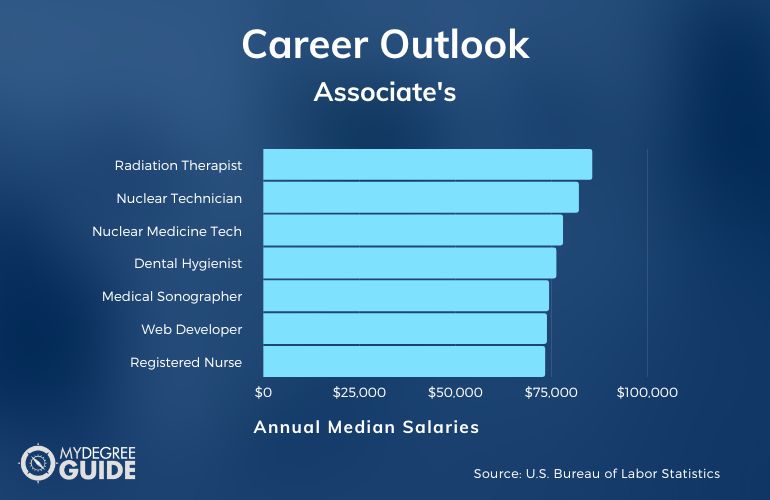Looking for online associates degree programs? Compare top areas of study and see which schools are offering the degree you want.

You can earn your first college degree by signing up for an online associate’s degree program. Requiring roughly two years of study, or less through an accelerated associates degree online, these programs can equip you with marketable skills and get you ready to make a real difference in your industry, your community, and your personal financial stability.
Editorial Listing ShortCode:
List of Schools Offering Online Associates Degree Programs
Methodology: Each of the colleges included below is regionally accredited and offers associate degrees that can be completed online. The list is alphabetical.
- Allen County Community College
- Barton County Community College
- Bismarck State College
- Bucks County Community College
- Central Texas College
- Cerro Coso Community College
- Cincinnati State Technical Community College
- Coastline College
- College of Southern Nevada
- Copiah-Lincoln Community College
- Eastern Gateway Community College
- El Paso Community College
- Fayetteville Technical Community College
- Georgia Military College
- Great Basin College
- Harrisburg Area Community College
- Highland Community College
- Hutchinson Community College
- Ivy Tech Community College
- Lone Star College
- Metropolitan Community College
- Minnesota State Community & Technical College
- Mississippi Gulf Coast Community College
- Northwest Mississippi Community College
- State Fair Community College
- South Texas College
- Tulsa Community College
- Vincennes University
- Western Wyoming Community College
- Williston State College
These are some of the best colleges for online associates degree programs.
Types of Associate Degrees
You can earn your associate’s degree in a wide variety of disciplines. Click on the area of study you’re interested in to jump to that section.
- Accounting
- Animation
- Business Administration
- Child & Adolescent Psychology
- Computer Science
- Criminal Justice
- Education
- Electrical Engineering
- Engineering
- Entrepreneurship
- Fashion
- Fire Science
- Graphic Design
- Health Services
- Healthcare Management
- Homeland Security
- Hospitality Management
- Human Services
- Information Technology
- Marketing
- Medical Assisting
- Medical Coding
- Medical Office Administration
- Network Administration
- Paralegal
- Pharmacy
- Photography
- Public Safety Administration
- Retail and Sales Management
- Small Business
Each of these degree possibilities are in-demand and offer much better job opportunities than having your high school diploma alone.
Accounting

Do you have a knack for math and numbers? If so, you could do well in an accounting career. Keep in mind that it’s also important to be organized and detail-oriented in this job. If you fit those qualifications, consider earning your associate’s degree in accounting.
This is a business program, so you can expect to take business classes during your studies. These may include business law, management, and economics.
Editorial Listing ShortCode:
Your accounting-specific courses may cover topics like taxation, financial accounting, and payroll. You may be able to choose a specific type of accounting to focus on during your degree program. For example, some schools offer associate degrees in tax preparation or forensic accounting.
An associate’s degree can prepare you for assistant or clerk positions. You could provide supportive services for a Certified Public Accountant, be in charge of a company’s payroll, or keep track of accounts receivable.
Animation

Perhaps you’ve been watching animated movies since you were young and have always been fascinated by the magic of bringing still pictures to life. You might want to begin creating some of that magic yourself by studying for an associate’s degree in animation.
Natural artistic ability and a willingness to improve your talent are helpful characteristics for someone interested in this field.
Animation coursework typically focuses heavily on artistic disciplines. Courses usually include studies in art history and cultural stories as well. In classes like Drawing Fundamentals, you can practice your artistic skills.
Editorial Listing ShortCode:
After learning fundamentals, Animation degrees then teach students how to turn drawings into moving pictures. You may learn about using digital animation tools and producing videos.
With this associate degree program, you might be able to get an entry-level position in a field like advertising, television, movies, or video games. Titles might include junior animator or technical assistant.
Business Administration

Business is an enormous field that boasts many different career paths. Whether you’re interested in finance, management, public relations, sales, or human resources, a business career may be for you. To get started, pursue an associate’s degree in business administration.
An associate’s degree program can give you a broad overview of many different business topics. For example, you can expect to study accounting, business law, and global finance. You may find marketing, taxation, leadership, and team dynamics as other topics that you’ll cover.
Editorial Listing ShortCode:
You may have opportunities to try out some of the software programs and other technology tools that can streamline productivity for business professionals.
Having an associate degree in business may help you get a job in retail, such as a store management position. If you’d prefer office work, consider being an administrative assistant or a help-desk support professional. Other career options may include banking or sales.
Child & Adolescent Psychology

Working with kids and youth can be a rewarding career path because you can contribute to the development of the next generation.
Whether you want to work with children and teens directly or would prefer to operate behind-the-scenes in program administration, an associate’s degree in child and adolescent psychology can help you get started.
Courses in this associate degree program may include Human Lifespan Development and Introduction to General Psychology. Many Child and Adolescent Psychology courses discuss the relationships between children, their families, and the communities around them.
Editorial Listing ShortCode:
Other classes may address feeding nutritious meals to kids, teaching them through developmentally appropriate methods, responding to child abuse, and working among culturally diverse groups.
Graduates with an associate’s degree in child and adolescent psychology often work in educational or child-development settings. For example, you might become a caregiver at a daycare or serve as a classroom aide at an elementary school. You might also serve as an aide to a therapist, such as an occupational therapist.
Computer Science

If you spend a lot of time working with computers, you might find that computer science is a good degree program for you. Having strong math, science, and problem-solving skills can help you succeed in this area.
One of the most important skills that you can learn during your associate’s program is how to use programming languages. For example, you may study C++ and Java. Many Computer Science courses also teach how the various components of a computer, including hardware and software, work together.
Editorial Listing ShortCode:
Other important topics include cybersecurity, databases, algorithms, and networks. You may have opportunities for hands-on practice with programming tools.
An associate’s degree can help you get a job as a computer support specialist who helps others set up their computer systems or troubleshoot problems. You may also be ready to offer your services as a web developer after graduation. A small business may hire you as the IT coordinator.
Criminal Justice

Do you care deeply about making sure that society is safe and fair for everyone? You can put that passion to work in the field of criminal justice. This degree program benefits those who want to work in law enforcement or the court system.
The curriculum for an associate’s degree program in criminal justice will address criminology, which is the study of why crimes occur and how they affect individuals and society. You can also learn about the various components of the American criminal justice system; these include local police departments, correctional facilities, and courts.
Editorial Listing ShortCode:
Criminal justice in foreign countries may be covered as well. You may take additional classes like Juvenile Offenders and Forensic Investigations.
An associate’s degree can help you get a job as a security, police, parole, or corrections officer. You might hold a job in the court system, like being a bailiff or a paralegal.
Education

If you’re good at working with young people, consider putting that skill into practice with a career in education. With this degree, you can play a role in helping kids or teens learn new things and prepare for their futures.
Associate degrees in education can introduce you to learning theories and teaching methods. You can learn to present materials in ways that are appropriate for a learner’s age and development. Additionally, you can study child development, psychology, classroom management, and education law. The curriculum may also focus on the importance of building literacy and language skills.
Editorial Listing ShortCode:
Your associate’s degree in education might allow you to become a preschool teacher, a teacher’s aide, or a daycare worker, but it won’t be sufficient for becoming a licensed K-12 teacher.
Your credits may transfer smoothly into a bachelor’s program so that you can earn your state teaching credentials.
Electrical Engineering

Are you looking for a hands-on career that can give you opportunities to work with tools or technology each day? Think about going into electrical engineering.
Earning this associate’s degree can give you skills that much of the general population doesn’t have, and that’s great for your employability.
To get ready for this career path, you’ll need to study electronic components and structures, such as circuits. The classes can teach you how to practice safety when working with electronics and how to perform troubleshooting when things aren’t working correctly.
Editorial Listing ShortCode:
You may get to use computer programs to help you design electrical systems. You may find math and science classes included in your curriculum as well.
With this associate’s degree, you can look for work in many different industries. For example, your skills can come in handy for car manufacturing, HVAC installation, or computer repairs. You may enter these fields as a technician or a tester.
Engineering

If you’re looking for a degree program that offers high-salary jobs for those with an associate’s degree, consider studying engineering. This field of study can also give you plenty of opportunities to advance your career through further education. It’s a good choice for those who are math- and science-minded.
In fact, you should expect to take plenty of math and science courses during your associate’s degree program; these may include algebra, precalculus, chemistry, and physical science. Other classes will cover various technologies used in engineering, such as AutoCAD drafting systems.
Editorial Listing ShortCode:
You can also study mechanical processes and machining, and you may discuss ways to ensure that work meets quality standards.
This associate’s degree can help you enter many different engineering disciplines, including civil, mechanical, or electrical engineering. You won’t be eligible for licensure, but you can serve as an assistant or a technician. Getting your bachelor’s degree in engineering can help you advance.
Entrepreneurship

Perhaps you’re one of those people who always has an exciting new idea. Do you want to turn those ideas into successful companies? Earning your associate’s degree in entrepreneurship can help equip you with the business know-how you’ll need.
One of the first courses that you take for this associate degree program may be Introduction to Business. That class can teach you some of the foundational concepts that you’ll need throughout your business studies and your professional career.
Editorial Listing ShortCode:
Other important things Entrepreneurship programs typically cover are sales, marketing, human resources, accounting, and customer service. You may talk about managing teams, thinking creatively, overseeing projects, and improving communications.
This associate degree program can teach you to grow a business and provide excellent customer service. You can use that knowledge to help you start your own business or provide leadership in an established company. Industries to consider include retail, hospitality, food service, and entertainment.
Fashion

Does wearing the latest styles or helping others look their best fill you with excitement and enthusiasm? Your passion can set you up for success in the world of fashion. To learn more about turning your hobby into a career, pursue an associate’s degree in fashion.
Fashion students learn about textiles and their applications. You may explore patterns, textures, and colors and discuss how fabric technologies are moving the industry forward. You can learn to create pieces that are works of art with visual appeal.
Editorial Listing ShortCode:
Because fashion is a business, you may need to take classes in accounting, databases, marketing, and management as well. Retail and merchandising skills may be other important emphases of this program.
After graduation, you could work in a retail environment as a sales associate, a buyer, or even a store owner. An associate’s degree in fashion may also open opportunities in fashion design, tailoring, textile manufacturing, or clothing production.
Fire Science

Like many others, you may have dreamed of becoming a firefighter since you were a small child. In some municipalities, though, competition for firefighting jobs can be tough. You can set yourself apart from other candidates by getting your associate’s degree in fire science.
As the name implies, fire science is a scientific discipline. Students in this discipline study the reasons that fire behaves the way it does. Studies include information on combustion, heat release, chemistry, and the spread of flames.
Editorial Listing ShortCode:
In addition, your courses can also give you information on preventing fires, staying safe as a firefighter, and investigating the causes of fires. It’s also important to study the laws and ethics that should guide your work as a firefighter.
Most people who pursue this associate’s degree want to become firefighters or fire investigators. The skills you learn may also transfer over to EMT work or other first-responder roles.
Graphic Design

Do you want to use your impressive artistic skills to communicate important messages? An associate’s degree in graphic design can help you learn to do this effectively. You can develop marketable skills that are applicable in many industries.
This is an artistic discipline, so it covers topics such as arranging colors and designs in visually appealing ways. Learning to use digital tools to create images, layouts, and animations are typically important parts of this degree program.
Editorial Listing ShortCode:
Graphic designers usually use their work to persuade or influence others, so you may need to study human psychology, consumer behavior, marketing, and advertising. By the end of your program, you will probably have an impressive portfolio of your work compiled.
An associate’s degree can help you get an entry-level job in graphic design, such as being the assistant to a senior designer. Going on to earn your bachelor’s degree can help you move into more advanced roles.
Health Services

Have you ever thought about working in the medical field, but you’re not sure that becoming a doctor or a nurse is the right fit?
Studying for an associate’s degree in health services might be a good alternative for you. Like doctors and nurses, health services professionals play an essential role in the medical field.
For any healthcare job, it’s important to know the basics of medical care and terminology, so your curriculum will include classes on medical topics, like Healthcare Foundations and Human Anatomy.
Editorial Listing ShortCode:
Health services professionals often work in administrative positions, so you’re sure to study topics like billing, medical coding, and accounting. Healthcare law, including those that govern patient privacy, is another topic that should be studied.
Associate degree programs in health services can help you pursue office jobs as a care coordinator, a medical transcriptionist, or a medical biller. You could also provide direct patient care as a medical assistant in healthcare clinics.
Healthcare Management

If you care about people’s health and want to do a behind-the-scenes job that supports doctors and nurses, consider a career in healthcare management.
This associate’s degree program is often similar to health services but may include more classes that are specifically focused on the administrative side of healthcare.
For example, you can study medical terminology, coding, billing, reimbursement, and patient confidentiality. You’ll also need to learn how to use databases and other records-management tools.
Editorial Listing ShortCode:
Your coursework can also equip you with human resources skills like managing teams, overseeing employees, and resolving conflict. Striving to consistently deliver high-quality health services is typically a focus of this program.
After graduation, you can get started with an entry-level healthcare administration job like working at the front desk of a medical office, coordinating billing services, or managing patient files.
Work settings may include hospitals, doctor’s offices, dental offices, insurance companies, pharmaceutical companies, and nursing homes.
Homeland Security

You care about your community and your country. Help keep them safe and secure by studying to earn an associate’s degree in homeland security.
When you think about homeland security, the first thing that comes to mind may be protecting the country from outside threats, but this discipline also addresses issues in local communities.
Homeland Security programs cover criminal justice topics, such as the court system and law enforcement. Another common topic of study is how to prepare communities for natural disasters and other emergencies so that plans are in place ahead of time.
Editorial Listing ShortCode:
Other studies in this field include information on terrorism and the methods and weapons that are used. You may learn what is currently being done to address terrorism and start exploring ways you can contribute.
This homeland security associate degree can help you get a job in security or police work. You might pursue employment in an area like border patrol, immigration, or customs.
Hospitality Management

If you enjoy making others feel welcome and comfortable in your home, then you might want to pursue a career along those lines. With an associate’s degree in hospitality management, you can learn to create environments or offer services that appeal to guests and visitors.
Your classes can help you learn what it takes to manage facilities so you can be prepared to offer leadership and supervision to a team of employees. Another course may teach you about various laws or regulations that apply to the hospitality industry.
Editorial Listing ShortCode:
In case you want to run your own business, you may take a class on buying food service or lodging establishments. You may also take business classes that can help you learn tips for marketing and advertising your business.
Restaurant and hotel work are popular options for graduates; other industries to consider include tourism and entertainment. You might be ready to hold a management role or work in a guest-relations department.
Human Services

People going through hardships need the support of community resources and programs. You can help administer these programs when you pursue a career in the field of human services, and your work can give you the satisfaction that comes with knowing you are helping those in need.
Associate degree programs in human services address many of the struggles and crises that people commonly experience. These may include abuse and addiction.
You can learn how to provide effective and ethical supports through programs, counseling, or case management and also how to set healthy boundaries.
Editorial Listing ShortCode:
During your human services career, you’ll probably work with many different people, so it’s important to understand psychology, cultural diversity, and clear communication.
You may work one-on-one with people as a caseworker or a direct support professional. Supervisors may depend on you to serve as a liaison between clients and the service programs in your community.
Information Technology

Understanding IT equipment and systems can help give you marketable skills that can be applied in nearly any industry. If you’re interested in computers, databases, and networks, then consider enrolling in school to earn an associate’s degree in information technology.
Common studies for this associate’s degree include courses on network components and designs, including ways to protect network security. You may practice using programming languages and designing simple programs.
Editorial Listing ShortCode:
It’s also important to discuss how to evaluate the systems that you create. Because IT is a business discipline, you can expect to take basic business classes and learn about project management. You may need to take advanced math courses as well.
Web developers often earn a decent salary with an associate’s degree in IT. Other career possibilities include working as a network specialist or a computer support representative. You could be a consultant or get a job in a company’s IT department.
Marketing

Do you feel like you have a good handle on how people think and what motivates their behaviors? Those skills can give you an advantage in the world of marketing. This exciting field needs trained professionals, such as those with an associate’s degree in marketing.
The curriculum may include classes like Consumer Behavior, Introduction to Retail and Selling, and Public Speaking. These can help you learn to evaluate audiences and create messages that will resonate with their needs and wants.
Editorial Listing ShortCode:
These skills are useful for brainstorming advertising strategies and public relations campaigns. In this business-focused area of study, you’ll likely take one or two classes like Business Communication or Business Law.
An associate’s degree can help you get entry-level jobs in marketing, such as being an assistant to a public relations manager or a market analyst. Managing a retail sales team is another job that you might be able to do right away.
Medical Assisting

Doctors and nurses need strong teams of medical support professionals around them. With an associate’s degree in medical assisting, you can learn to perform basic services for the patients in your clinic. This is a hands-on career path that can allow you to have contact with a variety of people.
The classes in your degree program can introduce you to some of the fundamentals of medicine and the healthcare system. You an also expect courses on anatomy and medical terminology.
Learning about healthcare laws as well as insurance coding and reimbursement can help you operate within the U.S. healthcare system. You may also practice using technology systems for recording and organizing patient data.
Editorial Listing ShortCode:
It’s common for schools to require students in this associate’s degree program to earn clinical practicum hours.
After graduation, look for medical assistant jobs in doctor’s offices, hospitals, dental offices, or other healthcare facilities. You might perform direct patient care or do office work.
Medical Coding

Are you interested in a flexible job that you can work around your schedule? An associate’s degree in medical coding could be your ticket to this type of career. In fact, many medical coders can work from home.
Students in this discipline learn how to do medical billing and coding, and they may also gain medical transcription skills.
If you decide to pursue this associate’s degree, you should plan to take classes in human anatomy and physiology so that you’ll have a better understanding of the terms used in medical settings.
Editorial Listing ShortCode:
Additionally, medical coders work with systems that are used for entering, recording, and organizing medical data. Your coursework may prepare you to take a certification exam after graduation.
With this associate’s degree, you could get a job as a medical coder who works with inpatient or outpatient files. You could also become a records specialist who maintains medical databases.
Medical Office Administration

As a medical office administrator, yours might be the first face that patients see when they arrive for a medical appointment. Your professional competence may help reassure them about the exam or procedure that they’re about to have.
Getting your associate’s degree in medical office administration can also prepare you to take a behind-the-scenes role in keeping a medical office running smoothly.
To earn this degree, you’ll need to become familiar with medical terminology, coding, billing, and insurance. You must learn about the laws that govern patient privacy and become familiar with data-entry software systems.
Editorial Listing ShortCode:
Because you’ll be working on the business end of medical care, you’ll need to learn some basic finance and business communication skills.
As a medical office administration professional, you could work in a physician’s office, a dentist’s office, a hospital, or another medical center. Common job titles include medical secretary, records technician, or medical receptionist.
Network Administration

If you’re a computer whiz who wants to make a living by working with tech, consider starting with an associate’s degree in network administration. Not everyone has computer skills, so those who don’t depend on those that do to take care of their systems.
You may be able to put your know-how to work in a variety of different industries.
This degree plan may include classes like Introduction to Network Systems, Computer Hardware and Software, and Routing and Switching.
Editorial Listing ShortCode:
Courses in Network Administration cover different types of networks, including those that are contained within a single office building and those that span the globe. There may be lab experiences that you need to complete as part of your studies.
These associate degrees can prepare you to answer questions and troubleshoot problems for computer users. You could be a network support technician or manage an organization’s databases.
Paralegal

If you aren’t sure about setting your sights on law school but like the idea of working in a legal environment, think about becoming a paralegal. In this career, you can take on responsibilities like researching legal statutes, preparing reports, and organizing evidence files.
With this associate’s degree, you can start your studies by learning the fundamentals of paralegal work and gaining a basic overview of the U.S. legal system. After that, you can enroll in classes on conducting legal research and preparing legal reports.
Editorial Listing ShortCode:
You can also learn about the similarities and differences between civil and criminal law and get an overview of specific law disciplines, such as family law and contract law.
As a graduate of a paralegal program, you can use your degree to obtain work as a paralegal, a legal secretary, or a legal assistant. You might work in the office of a single attorney or be part of a larger law firm.
If you already have a job or other life responsibilities, but would like to earn a degree to become a paralegal, you may want to enroll in of the online paralegal programs that some colleges offer.
Pharmacy

As long as people need medications, pharmacy professionals will be in demand. You can fill this need as a pharmacy technician, and an associate’s program can help you gain the necessary skills.
To earn your degree, you’ll need to study the basics of how drugs work in the body and interact with one another. You’ll need to learn to read prescriptions, provide proper doses of medications, and maintain computer-based records.
Other topics commonly covered in this degree include privacy laws and professional ethics for pharmacy work.
Editorial Listing ShortCode:
With a pharmacy technician associate’s degree, you can work under the supervision of a licensed pharmacist to fill prescriptions. Another career option is working for a medical supply company as an inventory or records specialist.
But if your eventual career goal is to become a pharmacist, it’s better to look for a two-year pre-pharmacy degree program rather than an associate’s degree in pharmacy technician.
Photography

Do you enjoy the art of taking photos? Do you have a knack for lighting and composition? You may have what it takes to become a professional photographer. An associate’s degree in photography can help you refine your skills and learn to become a successful businessperson.
Color theory is an important part of photography curriculums, and you can learn to create eye-pleasing layouts. Other classes may focus on using effective lighting or communicating a message through photographs.
Editorial Listing ShortCode:
Associate’s degree programs often focus on digital photography, but you may learn about working with film as well. You also may have courses on using editing software or running a photography business.
Photographers can go into business for themselves, do freelance jobs, or work for an employer. You might specialize in taking pictures of commercial products, families, children, weddings, or sporting events, or you could focus on creating photos for display in galleries.
Public Safety Administration

If you care about the safety and wellbeing of the people around you, an associate’s degree in public safety administration can help equip you to serve your community well.
You can learn to provide leadership in agencies committed to public safety, including police departments, security agencies, dispatching centers, and fire departments.
The courses for this associate’s degree program can introduce you to the criminal justice system so that you can become more knowledgeable about the people and procedures that protect the public. You can explore ways to prepare for emergencies and plan how to respond when disasters strike.
Editorial Listing ShortCode:
Other topics may include communicating with the public, supervising teams, and maintaining ethical practices.
You can use your training to help you get a job as a police officer, a firefighter, a 911 dispatcher, a security guard, or an emergency-management professional. Having a college degree may help increase your chances of being promoted to supervisory positions.
Retail and Sales Management

If you thrive in a store environment, think about becoming a retail manager or a sales supervisor. This could be a good college path for you if you currently work on a store sales floor and want the skills to advance your position.
An associate’s degree in retail and sales management can help you turn your entry-level job into a lifelong career.
Store managers have many responsibilities, so you’ll likely study marketing, procurement, inventory, and sales. Other areas of focus may include bookkeeping, payroll, and accounting, so you’ll be able to keep track of your store’s finances.
Editorial Listing ShortCode:
It’s also a good idea to work on your skills in customer service and employee management.
This degree may help you get a promotion to store manager, district manager, or regional manager. You could also become a sales representative who manages customer accounts, or you could open your own store.
Small Business

Although the skills learned in a business administration program can transfer over to many settings, small businesses have unique needs, challenges, and opportunities.
In an associate’s program for small business studies, you can specifically focus on the skills and knowledge that you need in startups or local companies.
Like most business students, students in small business degree programs study accounting, management, business law, and marketing. These courses can help you become a well-rounded leader who can take charge of the many daily tasks that need to be handled in a small business.
Editorial Listing ShortCode:
To further help you succeed in this realm, you will probably take classes in entrepreneurship and learn how to design a workable business model that can grow with you.
You may want to pursue this associate’s degree in preparation for launching your own small business. If you’re already a small business owner, this course of study may help you improve your operations.
Associates of Arts Degree vs. Associates of Science Degree

When you pick out your degree program, you’ll have two main types of associate’s degrees from which you can pick: Associate of Arts (AA) or Associate of Science (AS).
Many schools offer a mix of these two programs. You may even have the opportunity to choose between the two types within a specific field of study; for example, your school may offer both an AA and an AS in Business Administration.
Before exploring the differences between these degree types, it’s worth noting that they have a good deal in common. Both are intended to give you a solid start for your career and your education.
Each requires around 60 credit hours, covers the core subjects needed for a college education, and should readily transfer into many bachelor’s programs.
When deciding which degree to get, it can help to consider your future work and school plans. The following table highlights some of the distinctions.
| AA Degree | AS Degree | |
| Emphasis | Social sciences and liberal arts | Math and science |
| Electives | May give you more options to choose your own electives | May be more specific about the exact classes you need to take |
| Transferability | Can usually transfer to many four-year colleges | Can usually transfer to many four-year colleges but may need additional prerequisites for some programs |
| Popular Future Degree Options | Liberal arts, such as English, history, and psychology | Technical studies, including math, science or healthcare |
It’s important to note that an Associate of Applied Science (AAS) degree is different from either an AA or an AS degree.
Getting an AAS is specifically for workplace preparation. The goal is to get you ready for a career in your chosen field right after graduation. If you decide to go back to school for a bachelor’s degree later, only some of your AAS credits may transfer into the program.
Associate Degree vs. Bachelor Degree

When you first enroll in college, you’ll work toward an associate’s degree or a bachelor’s degree. These are both types of undergraduate degrees.
Associate degrees usually take about two years to complete. They typically include the general education classes that are considered essential for a well-rounded college education.
These degree programs also include classes that focus on a specific discipline, such as health services or retail sales.
Bachelor’s degree programs are about twice as long. To earn a bachelor’s degree, you’ll take a core of general education courses as well as a good number of classes that focus on your particular area of study.
Associate degrees are fairly equivalent to the first two years of a bachelor’s degree program. As a result, you can often transfer your associate’s degree into a four-year school.
You may be able to start your bachelor’s program as a junior and have only two years of study remaining. During that time, most of your classes should be upper-level courses that are specific to your major.
| Associate’s Degree | Bachelor’s Degree | |
| Length | Approximately two years | Approximately four years |
| Credit Hours | Around 60 | Around 120 |
| Cost | Fewer credit hours means lower overall cost | Higher credit-hour requirement increases the total cost |
| Depth of Study | Basic education courses plus a few introductory classes in your field of study | Follows up basic and introductory classes with a few years of in-depth coursework in your field of study |
| Next Steps | Enter the workforce or transfer into a bachelor’s program, which will usually take an additional two years to complete | Enter the workforce or apply to grad school for a master’s degree |
Earning an associate’s degree can provide a great way to try out your chosen field with an affordable course of study that you can complete in two years or less. You can add on bachelor’s studies later if you’d like.
Jobs You Can Get with an Associate’s Degree

Even though an associate’s degree may take you two years or less to complete, it can still lead to a successful career. In fact, there are even jobs that pay 50k a year with an associate’s degree.
According to the Bureau of Labor Statistics, some career paths to consider, beginning with some of the highest paying jobs with an associate’s degree, include:
| Job | Median Annual Salary | Relevant Associate’s Degree(s) |
| Radiation Therapist | $85,560 | Radiation Therapy |
| Nuclear Technician | $82,080 | Nuclear Technology |
| Nuclear Medicine Technologist | $77,950 | Nuclear Medicine Technology |
| Dental Hygienist | $76,220 | Dental Hygiene |
| Medical Sonographer | $74,320 | Sonography |
| Web Developer | $73,760 | Computer Science or Information Technology |
| Registered Nurse | $73,300 | Nursing |
| Aerospace Engineering Technician | $66,020 | Engineering |
| Electronics Engineering Technician | $65,260 | Electrical Engineering |
| Network Support Specialist | $63,460 | Information Technology |
| Police Officer | $63,150 | Public Safety Administration |
| Fire Inspector | $61,660 | Fire Science |
| Sales Representative | $59,930 | Retail and Sales Management |
| Food Service Manager | $55,320 | Hospitality Management |
| Computer Support Specialist | $54,760 | Computer Science or Information Technology |
| Lodging Manager | $54,430 | Hospitality Management |
| Funeral Service Worker | $54,150 | Mortuary Science |
| Paralegal | $51,740 | Criminal Justice or Paralegal |
| Firefighter | $50,850 | Fire Science |
| Bailiff | $47,830 | Criminal Justice |
| Medical Records Technician | $42,630 | Health Services, Healthcare Administration or Medical Office Administration |
| Financial Clerk | $42,420 | Business Administration |
| Dispatcher | $40,190 | Public Safety Administration |
| Administrative Assistant | $39,850 | Business Administration |
Gaining experience or going back to school for more education can help you move up in your field. You may be given positions of greater responsibility, or you may receive a higher salary.
Accreditation for an Online Associates Degree

An associate’s degree can help you land a good job if it comes from a reputable school that holds regional accreditation.
The seven regional accreditors in the U.S. are:
- Accrediting Commission for Community and Junior Colleges (ACCJC) Western Association of Schools and Colleges
- Higher Learning Commission (HLC)
- Middle States Commission on Higher Education (MSCHE)
- New England Commission of Higher Education (NECHE)
- Northwest Commission on Colleges and Universities (NWCCU)
- Southern Association of Colleges and Schools Commission on Colleges (SACSCOC)
- WASC Senior College and University Commission (WSCUC)
Colleges that have received approval from one of these organizations offer academic programs that meet national standards, so you can count on getting a solid education.
Financial Aid for Students in an Associates Degree Program

Some people hesitate to jump into higher education because they don’t know if they’ll be able to afford the cost of tuition. Although school can be expensive, there are ways to make it more affordable.
Financial aid comes in many forms. Federal financial aid may be the most common. The government hands out grants and low-interest loans to those who qualify.
To learn what you’re eligible for, you’ll need to fill out the Free Application for Federal Student Aid (FAFSA). You may find out that you can get grants or loans or that you qualify to participate in the Federal Work-Study Program.
Your state may distribute similar assistance, and it’s a good idea to use both state and federal help if you can. The FAFSA results may determine your eligibility for state aid as well as federal aid.
Other assistance may come from private sources. These sources may include:
- Payment plans from your university
- Scholarships from local or national organizations
- Tuition-reimbursement programs from your employer
You can use a mix of government and private assistance to help you cover the cost of your tuition.
What is an Associate’s Degree?

Like a bachelor’s degree, an associate’s degree is an undergraduate college degree. It is sometimes known as a two-year degree because, traditionally, it takes about two years of coursework to finish the program.
The curriculum for an associate’s degree usually includes general education courses in writing, math, science, and other basic subjects. The remaining classes are related to a specific area of study, which may be referred to as a major.
This well-rounded education can help demonstrate to employers that you are a knowledgable individual who can handle a variety of tasks and challenges.
Can You Get Your Associate’s Degree Online?
Yes, schools often offer associate degree programs online. Enrolling in an online associate’s degree program can be an excellent way to take college classes while still holding a full-time job or taking care of your family.
You can expect the coursework for an online associate’s degree program to be similar to on campus classes. You can complete reading assignments, turn in papers, and even engage in discussions with your classmates.
To ensure that you’re receiving a quality online education, always select a school with regional accreditation.
How Long Does It Take to Get an AA Degree Online?
Traditional associate’s degrees take two years to earn. Students attend school for four semesters, and they may take a few summer classes as well. For online colleges that rely on this format, full-time enrollment is likely to take 2 to 2.5 years.
Other online schools offer the same amount of learning, but they may do it in less time. These colleges typically hold short class sessions that are offered one after another.
After eight weeks or so on a topic, you’ll move on to the next course. With this approach, you may have your degree in just 12 to 20 months.
Can I Get My Associate Degree in 6 Months Online?

There are a good number of online associate’s degree programs that dedicated students can finish in around 12 months. These usually rely on accelerated schedules with classes that last just a few weeks each.
If you begin a program with college credit, you can cut that time down even shorter — perhaps to as little as six months. Your school may give you credit for work experience, previous college classes, or CLEP testing.
What Jobs Can You Get with an Associate of Arts Degree?
There are many jobs that you can do with an Associate of Arts degree. You could be a store manager, an office administrator, a restaurant manager, or a concierge. You could pursue an artistic job in animation, photography, or fashion.
There’s even the option to open your own business. Just keep in mind that Associate of Arts degrees come in many forms, and your specific major will help determine which jobs you should pursue.
Are There Any Online Associates Degrees That Pay Well?
Many jobs that require associate degrees command a decent salary. With an associates degree in nursing, you might be on your way to earning $73,300 per year as a registered nurse (Bureau of Labor Statistics). Earning a computer science associate’s degree could help you pursue a good-paying job as a web developer.
Other promising educational paths for associate degrees include electrical engineering, information technology, dental hygiene, public safety administration, and criminal justice.
How Much Does an Online Associates Degree Cost?
The base price of an associate’s degree is usually $7,000 or more, but some online schools offer lower tuition. To find the most affordable rate, it’s usually smart to enroll in the online associate degree program of a community college or an in-state school.
If the tuition still seems daunting, be sure to apply for financial aid. Also, consider choosing a school that will give you credit for your work experience or your CLEP exam scores. Investigating these options is free, and can potentially result in a more affordable rate.
Is an Associates Degree Worth It?

Do you want to get started on your career quickly? Are you interested in a good-paying job that doesn’t require years of schooling? Do you want to try out the college experience before committing to a four-year program?
If you answered “yes” to any of those questions, then consider an online associate’s degree.
Associate’s programs can equip you with employable skills, and many can set you up for high-paying positions in fields that require no further education. An associate’s degree can also serve as a stepping stone to bachelor’s studies. Get started by applying to online associate’s programs today.
